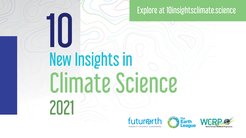10 New Insights in Climate Science 2021
As compounding impacts from our worsening climate crisis become more visible around the globe, leading scientists have released a compilation of the 10 most important new insights on the climate. The 10 New Insights in Climate Science series is a horizon scan of the most pressing research findings and emerging scientific insights to help inform immediate and equitable transformations across sectors to preserve a safe and habitable planet.
In a report presented today to Patricia Espinosa, Executive Secretary of the United Nations Framework Convention on Climate Change (UNFCCC), report authors outlined some of the most important recent findings related to climate from across a wide range of disciplines. Among these distinct but interrelated topics is the increase in megafires around the world as well as new justifications for the costs of rapid climate action, each accompanied by targeted policy recommendations at various scales of action.
Joint press release of "The Earth League", "futurearth" and The "World Climate Research Programme", Glasgow

”Whilst we are rapidly running out of time to limit climate change, this report shows that stabilizing at 1.5°C is still possible, but only if immediate, and drastic global action is taken.” says Dr. Wendy Broadgate, Future Earth Global Hub Director, Sweden. “World leaders at COP26 must set aggressive goals for emissions reductions – nothing short of 50% greenhouse gas reductions by 2030 and net zero targets by 2040 is sufficient.”
The report warns that we are on the verge of or already past the point of exhausting the carbon budget for exceeding global warming of 1.5°C, with observed increases in methane and nitrous oxide emissions that may even set us on a path to 2.7°C warming. As temperature warms, so too does the risk of carbon-feedback cycles that may lower the threshold climate tipping points, such as the observed rapid melting of the Antarctic Pine glacier that may result in sea level rise of 0.5 meters or more. Given that human and ecosystem health are inextricably linked, deep transformations of energy and consumption patterns are required that must also take into account justice and equity, including support for vulnerable populations.
New research, however, shows that the costs of mitigating climate change are far outweighed by immediate co-benefits to both people and planet, such as the restoration of natural ecosystems – which also represent high economic value – as well as the many improvements to human health and well-being. For example, renewable energy transitions could dramatically lower the 6.67 million deaths caused by air pollution annually, while strong methane reductions could boost agricultural yields around the globe.
“Our knowledge of the climate system has grown rapidly in recent years, but policymaking has yet to catch up with these critical advances,” says Prof. Detlef Stammer, Professor at the University of Hamburg and Joint Scientific Committee Chair of the World Climate Research Programme. “This report’s findings are a strong call to decision-makers to meet the urgency of the state of our climate and help put us back on a path to a sustainable future.”
A key addition to this year’s report is the inclusion of key implications for policy makers at global, regional, and local levels. For example, to better support household behaviour changes – a crucial but often overlooked opportunity for climate action – the report recommends defining equitable “consumption corridors” through democratic processes that place the burden of demand-side changes on high-emitting consumer elites. Importantly, to stay within the critical 1.5°C warming target the report also recommends an aggressive mid-term goal of a global 50% reduction in greenhouse gas emissions by 2030 as well as an ambition of net-zero by 2040.
“COP26 is a pivotal moment in our relationship with nature, as this year’s 10 New Insights in Climate Science makes clear,” says Prof. Peter Schlosser, Vice President and Vice Provost of the Julie Ann Wrigley Global Futures Laboratory at Arizona State University and co-chair of the Earth League. “It is our hope that this summary of the latest research from scientists around the world can help drive the global transformations we so desperately need.”
This year’s top insights:
- Stabilizing at 1.5°C warming is still possible, but immediate and drastic global action is required.
- Rapid growth in methane and nitrous oxide emissions put us on track for 2.7°C warming.
- Megafires – climate change forces fire extremes to reach new dimensions with extreme impacts.
- Climate tipping elements incur high-impact risks.
- Global climate action must be just.
- Supporting household behaviour changes is a crucial but often overlooked opportunity for climate action.
- Political challenges impede the effectiveness of carbon pricing.
- Nature-based solutions are critical for the pathway to Paris – but look at the fine print.
- Building resilience of marine ecosystems is achievable by climate-adapted conservation and management, and global stewardship.
- Costs of climate change mitigation can be justified by the multiple immediate benefits to the health of humans and nature.
"Science is clear, exceeding 1.5°C of global warming poses major challenges for humans and societies around the world, and raises the risks of crossing critical tipping points that regulate the state of the climate system", says Prof. Johan Rockström, Director of the Potsdam Institute for Climate Impact Research and Co-Chair of the Earth League. "We do not know exactly, at what temperature rise tipping elements shift from dampening to self-reinforcing global warming, but it is increasingly clear that we must stay as far away as possible from 2°C. This makes tipping elements like the Greenland ice sheet and our large forest systems, our new global commons, which need to be governed by the world community, to secure our future on Earth."
Ana Bastos, scientific group leader at the Max Planck Institute for Biogeochemistry in Jena, is amoung the authors of the new 10 New Insights in Climate Science 2021.

